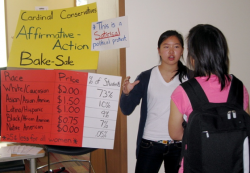
After rejecting several previous proposals over the past several years, the UCLA faculty has finally succumbed to politically correct pressure from above (Eugene Block, the Chancellor, and other administrators) and below (“progressive” students) and voted to impose a four-unit “diversity” course requirement on all undergraduates. Ironically, the felt necessity for this new course requirement reveals […]
Read More
A new report from the University of Pennsylvania’s Graduate School of Education, Black Male Student-Athletes and Racial Inequities in NCAA Division I College Sports, points with horror at the “racial inequities” in big-time college sports, finding it “shocking” and “astonishing” that college leaders, the NCAA, and the public at large have “accepted as normal the […]
Read More
On November 6 the voters of Oklahoma, following in the footsteps of voters in California (1996), Washington (1998), Michigan (2006), Nebraska (2008), and Arizona (2010), passed a constitutional amendment that prohibits the state from offering “preferred treatment” or engaging in discrimination based on race, color, gender, or ethnicity. On November 15 eight of the fifteen […]
Read More
Yesterday the full U.S. Court of Appeals for the Sixth Circuit held that Michigan’s Proposal 2 violates the U.S. Constitution’s Equal Protection Clause. Proposal 2 was a ballot initiative that amended the state constitution to provide that state and local government agencies (including public universities) in Michigan “shall not discriminate against, or grant preferential treatment […]
Read More
By Stuart Taylor, Jr. and Richard Sander Even for people who approve in principle of some use of racial preferences in university admissions — notably including Justice Anthony Kennedy — the size of the preferences, and of the resulting racial gaps in academic performance in college and beyond, should matter a great deal. So it’s […]
Read More
Browsing through the collection of over 70 pro-“diversity” amicus briefs submitted on behalf of the University of Texas in the Fisher case, I am reminded, as I often am, of how eerily the current defense of “taking race into account,” i.e., preferential treatment based on race, resembles the old Southern arguments in defense of segregation. […]
Read More
In explaining why the American Jewish Committee had (with his help) supported Alan Bakke’s lawsuit against the University of California but also supported the University of Michigan’s racial preferences in Gratz and Grutter, Alan Dershowitz wrote that We feared that our hard-earned right to be admitted on the merits would be taken away. The WASP […]
Read More
For a half century I’ve vehemently opposed racial preferences in higher education. Opposition was partially ideological–I believe in merit–and partly based on sorrowful firsthand experience with affirmative action students and faculty. Though my principles remain unchanged I am now ready to concede defeat, throw in the towel and raise the white flag. Abolishing racial preferences […]
Read More
Get ready for a brand new defense of affirmative action that you’ve never heard before: preferences are necessary to assure selection by merit. How can that be? Simple. Just rework Claude Steele’s theory of stereotype threat–that minorities do less well on tests than their abilities warrant out of fear that their performance will confirm negative […]
Read More
Cross-posted from Open Market. Diversity training doesn’t work, according to an article in Psychology Today. In it, Peter Bregman notes, “Diversity training doesn’t extinguish prejudice. It promotes it.” But don’t expect it to stop. Government regulations often require that a school be accredited, a condition that accreditors like the American Bar Association use to force […]
Read More
“Diversity,” as everyone surely knows by now, is the sole remaining justification for racial preference in higher education allowed by the Supreme Court. Defenders seem to regard it as even more essential to a good education than books in the library or professors behind the podium. But a funny thing has been happening on the […]
Read More
As the most important higher-education case in a decade makes its way to the Supreme Court–the Fisher case on racial preferences–UCLA law professor Richard Sander had an excellent series of posts at the Volokh Conspiracy summarizing one critical argument that his research has helped to highlight: that even the ostensible beneficiaries often are harmed (or […]
Read More
Surprise, surprise. Affirmation action for college admissions is yet one more time in the hands of the Supreme Court (Fisher v. Texas). Given the Court’s changed personnel from the last go around (Grutter v. Bollinger, 539 U.S. 306 2003), race-based preferences may soon be history. But, would this judicial outcome finally doom preferences? Opponents of […]
Read More
As you probably know by now, the Supreme Court has agreed to hear Fisher v. Texas, depending on your point of view a promising or threatening challenge to affirmative action. Major and minor media, blogs, whatever, are all filled with cries of hope or wails of fear that the racial preferences sanctified in Grutter will […]
Read More
On February 2 Daniel Golden, former Wall Street Journal reporter and author of a highly regarded book on college admissions, reported in Bloomberg’s Business Week that Harvard and Princeton are being investigated by the Dept. of Education’s Office for Civil Rights for discrimination against Asians. It’s not the first time. In fact, for the past […]
Read More
These days, the agenda of the academic elite can be boiled down to a few liberal buzzwords. The most important buzzword is “diversity,” which is usually nothing more than a code word for reverse discrimination and skin-deep identity politics. Recently, at Northwestern, they held a “race caucus” where 150 people gathered to discuss their experiences […]
Read More
NAS president Peter Wood has defended the organization’s handling of the Jennifer Keeton case, which I have criticized on both legal and, more recently, policy grounds. Though I strongly sympathize with the general ideals of NAS, the organization’s off-base position on Keeton, which Wood’s essay reaffirms, has ended its heretofore consistent–and commendable–resistance to on-campus preferences.
Read More
In a recent essay in Minding the Campus, blogger John S. Rosenberg argued that I was too tough on legacy preferences and not tough enough on affirmative action in college admissions. In my support for class-based affirmative action, he says, I’m not sufficiently outraged about racial preferences. And in arguing that legacy preferences are illegal […]
Read More
Richard Kahlenberg of the Century Foundation is well known for his relentless, articulate, well-researched arguments that affirmative action should be based on class, not race. My reaction to these arguments is usually rather tepid. I find Kahlenberg’s arguments compelling only insofar as he also criticizes race-based preferences, and his criticism of them usually doesn’t go very […]
Read More
Most observers have framed the recent disruption by backers of racial and ethnic preferences at the University of Wisconsin-Madison as a free-speech conflict. Free speech is clearly involved but lying below the surface are three issues that warrant close attention, specifically how Wisconsin once handled “inclusion;” how the protest reflects the transformation of the idea […]
Read More
Elmhurst College, in what is apparently a first, will ask this question on its admissions application: “Would you consider yourself a member of the LGBT (lesbian, gay, bisexual, transgendered) community?” Answering the question will be optional; applicants may chose “yes” or “no” or “prefer not to answer.” Those answering yes to the LGBT question will […]
Read More
The American Scholar is the official journal of the Phi Beta Kappa Society — the college honorary society– and like The New York Times and The New York Review of Books, its focus is highbrow and its writing quality generally of a high order. Also like the Times and the NYRB, when dealing with current political […]
Read More
Legacy preferences have come under increased scrutiny of late, as well they should. Most elite colleges and universities, including all the Ivies, grant legacy preferences, just as they all grant special consideration — and lowered admission standards — for recruited athletes, blacks, Latinos, and Native Americans. They also give huge boosts to the sons and […]
Read More
The U.S. Court of Appeals for the Fifth Circuit not only upheld racial preferences in college admissions decisions on Jan. 18 but upheld them with a vengeance. The Fifth Circuit’s three-judge panel unanimously agreed, in Fisher vs. University of Texas at Austin, that UT’s flagship campus in Austin could consider an applicant’s race and ethnicity […]
Read More
Just how much are “legacies” – students with family ties to graduates – granted an edge in admissions to the most elite institutions in the United States? Until recently, the answer to this question, based on relatively simple analyses of acceptance rates of legacies and non-legacies, had been fairly settled. Legacies, according to the best […]
Read More
Ward Connerly, founder and chairman of the American Civil rights Initiative, a group opposed to race and gender preferences, spoke yesterday at Wesleyan University, in the wake of controversy over an affirmative action bake sale there satirizing preferences in college admissions. He spoke without a text, but we asked for an account of what he […]
Read More
When the history of the decline and fall of the regime of racial preference is written, recognition will of course be given to the power of the moral, philosophical, historical, legal, and political arguments arrayed against the repugnant notion that benefits and burdens should be distributed on the basis of race. But it seems to […]
Read More
The Arizona Civil Rights Amendment, also known as Proposition 107 or HCR 2019, will be on the November, 2, 2010, ballot. Virtually identical to similar measures launched by Ward Connerly and passed by substantial margins in California, Washington, Michigan, and Nebraska, Prop. 107 would amend the Arizona constitution to prohibit the state from “discriminat[ing] against […]
Read More
The Chronicle of Higher Education has been running a series of short articles on “What’s The Big Idea?” in which various scholars respond to the question, “What will be the defining idea of the coming decade, and why?” A couple of days ago Linda Kerber, an old friend of mine (at least she was before […]
Read More
By Ward Connerly More than thirteen years ago the people of California voted to end discrimination and “preferential treatment” on the basis of race, sex, color, ethnicity and national origin, in the public arenas of contracting, education and employment. The margin of the vote on the ballot initiative (Proposition 209) that enshrined the principle of […]
Read More